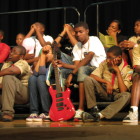
Violence Forum Unites Teens, Experts
|
A scarlet red electric guitar would normally seem out of place at a youth violence forum, but Monday evening the bloodstained instrument served as a symbolic reminder of a young man’s life cut short. Eighteen-year-old Blake Jimerson clutched it in homage to his fallen friend Katerius “Terry” Moody throughout the “Just Squash It” Emergency Town Hall Meeting, an event prompted in part by the murder of the Benjamin E. Mays High School graduate on June 26th at an East Point block party. The 18-year-old crooner was fatally shot during an impromptu performance; four other teens were wounded. “This is the last thing Terry had on him before he died,” Jimerson, a recent Washington High School graduate, told the audience of more than 100 about his friend who had planned to enlist in the U.S. Marines next month. “The blood is still on it.”
The meeting at B.E.S.T. Academy, an all-male middle school in Northwest Atlanta, was touted as an opportunity for Metro Atlanta youth -- and those who work directly with them -- to come together to propose solutions.

